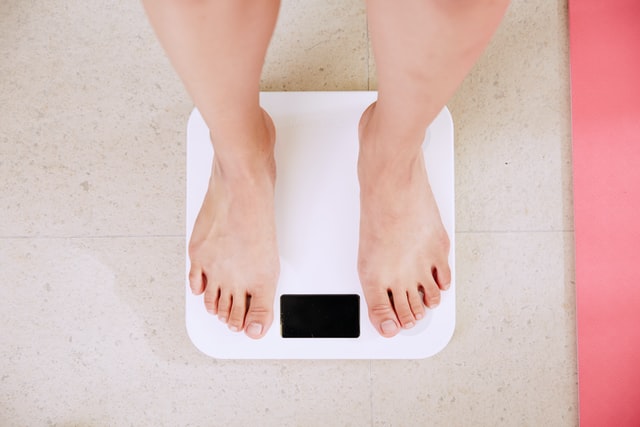Intermittent fasting is hot on the trend and many swear by its weight loss benefits.
If you’re a female like me and thinking, “why the heck is intermittent fasting not working for me?”. You’re not alone!
Females have a harder time losing weight than males. This does not mean intermittent fasting does not work – just means that weight loss results can be slower to show.
This article will guide all women to intermittent fast successfully and lose weight on the way.

What is Intermittent Fasting?
Intermittent fasting is a popular topic in the world of diet and weight loss.
Instead of conventional diets which restrict the type and quantity of food intake, intermittent fasting focuses on eating patterns.
You intermittently fast by cycling through set periods of eating and fasting. The timing of this is up to you to decide, which means you can choose one that fits your lifestyle.
How Do Women Lose Weight With Intermittent Fasting?
Weight loss occurs in periods of fasting through burning excess fat storage in our bodies.
The body usually fuels itself using simple carbs that are readily available from our meals.
The leftover carbs get stored in the liver as a backup in the form of glycogen and fat. Usually, the body uses glycogen first then when that’s depleted it taps into the fat storage.
The idea of intermittent fasting is that during a period of not eating, we give our body a chance to tap into glycogen first, and use our fat storage to make fuel.
Thus, fat loss!

If we eat continuously throughout the day, the body will always use the carbs from our meals to produce energy.
So, there is no opportunity for burning excess fat. This makes us prone to gaining weight as we are always bulking and not losing.
How much weight will I lose with intermittent fasting?
On average, a person who intermittent fasts can lose up to 4kg in one year, according to The American Journal of Nutrition.
You are likely to lose more weight with intermittent fasting if you:
- Eat fewer calories per meal
- Fast for longer
- Adhere strictly to fasting windows
Not losing weight on intermittent fasting?
If you are a woman, and intermittent fasting is not helping you drop a few pounds, do not worry!
You are certainly not alone and it does not mean you’ve done it wrong either.
A male and female’s metabolism and the way we lose and gain weight are different.
Females in general have a harder time shedding weight because of higher body fat than muscle. Thus females have a lower metabolic rate than males.
Females naturally tend to store more fat than males after a meal due to the effect of estrogen. This mechanism of fat storage is thought to prepare women for childbearing according to Obesity Reviews.

BUT… this does not mean that intermittent fasting to lose weight does not work.
It just means that a little more patience is needed to see results.
Intermittent Fasting Weight Loss Calculator
Calorie deficit is king in weight loss.
Depending on which intermittent fasting schedule you select, at least one whole meal is cut out each day. This reduces the amount of caloric intake, making weight loss easier.
However, intermittent fasting alone will not help you lose weight if you consume too many calories.

Many recommend calorie counting while intermittent fasting. WHAT you eat is just as important as WHEN you eat.
Calorie counting helps us realise what we are consuming and encourages mindful eating. These are both very useful in weight loss.
Use this free calculator to figure out how many calories you should be eating a day.
Intermittent Fasting Rules and Schedules for Weight Loss
There are no real rules to intermittent fasting, compared to a conventional diet. This is what makes it so attractive to its followers.
The only strict rule to follow is time. Whichever schedule you decide to follow, make sure you fast and eat accordingly. During the fasting periods, you do not eat.
It’s that simple!
There are a few ways to go about intermittent fasting, below are the popular methods of intermittent fasting.
Pick one that fits you:
- 16:8 method
- Fasting for 16 hours, eating window of 8 hours daily.
- Typically involves eating two meals and skipping either breakfast OR dinner.
- For example: Eat your first meal at 12pm, and last meal before 8pm. Many choose to skip breakfast for convenience.
- 20:4 method
- Also known as ‘Warrior diet’ or Alternate Day Fasting.
- Fasting for 20 hours, eating window of 4 hours.
- Typically involves eating one meal or two small meals daily.
- For example: Eating like a Spartan, eating only dinner and fasting most of the day.
- 24 hour fast
- Fasting for 24 hours, eating 1 meal a day.
- Typically done 2-3 times per week.
- For example: Eat dinner, skip breakfast and lunch. Rinse and repeat.

- 5:2 fast
- Fasting for 2 days, eating 5 days.
- Allowance of 500 calories on eating days.
- For example: Eat Monday to Friday, fast on the weekend (with 500 calories allowance on each day).
- Alternate day fasting
- Fast on alternate days.
- Allowance of up to 500 calories on fasting days.
- Most studies are available on this type of intermittent fasting.
- 36 hour fast
- Involves fasting an entire day without eating.
- Typically done 2-3 times per week.
- For example Day 1 finish dinner at 8pm -> Skip all meals on day 2 -> Eat again day 3 breakfast 8am.

What can you eat and drink during intermittent fasting?
You cannot eat food during the fasting period.
You are only allowed to have water, black tea or coffee, non-caloric sweeteners and no-sugar gum.
Some intermittent fasting schedules allow for a certain amount of caloric intake e.g. 5:2 and alternate-day-fast.
There are no real food restrictions in the eating window during intermittent fasting.
The general recommendation is still to keep a healthy, balanced diet which includes:
- Whole grains and nuts
- High fibre fruits and vegetables
- Healthy, unsaturated fats
- Lean protein
- LOTS OF WATER

What you eat is still just as important as when you eat. It would be impossible to lose weight if your meals are a huge unhealthy calorie feast.
The Benefits of Intermittent Fasting:
The most obvious benefit of intermittent fasting is weight loss.
List of health benefits that are commonly mentioned:
- Weight loss
- Improves insulin resistance
- Manages type 2 diabetes
- Improves cardiovascular health
- Improves cognitive function
- Increases mental well being
Intermittent fasting also saves time and money.

Is Intermittent Fasting Safe?
Intermittent fasting is generally safe to do if you are fit and healthy.
Fasting has been a normal practice back in the ancient days. It was normal for humans to go several days without food when there was nothing to hunt.
Today, most of us can have each meal daily with no trouble.
Despite human evolution, our digestive system is not able to cope with an abundance of food and calories. Otherwise, obesity would not be even an issue.
Intermittent fasting is more “natural” and beneficial to the body. It is generally a safe and traditional method that all our ancestors did regularly.
However, that said, it is not for everyone.

Intermittent fasting is not recommended for those who have low body weight, are pregnant or breastfeeding and are below 18 years old.
Those with medical conditions could intermittent fast but should do this with medical advice.
Prolonged fasting could cause refeeding syndrome if not monitored.
Refeeding syndrome can cause metabolic abnormalities which can be life endangering. This is especially susceptible in those who have anorexia.
If you are thinking of intermittent fasting during pregnancy and breastfeeding, read more on this article.
If you have any medical conditions and do not fit the generic “young and healthy” category, ALWAYS consult your doctor before starting intermittent fasting.

Intermittent Fasting and Working out
It is safe to work out during intermittent fasting.
It is very achievable if you are sensible with your choice of workout and are aware of how it affects your body.
What sort of exercise should I do during intermittent fasting?
Low-intensity workouts are more suitable to be paired with intermittent fasting than high-intensity ones.
- Low-intensity work out: Yoga, Pilates & Walking.
- High-intensity work out: HIIT & Strength training.
This is because the harder the workout, the more energy/fuel the body needs.
Intermittent fasting can lead to reduced calorie intake and thus less energy to effectively complete high-intensity workouts.
These workouts can be more challenging to complete but nothing is impossible!

Can I still do body-building with intermittent fasting?
Yes, you can body build while intermittent fasting.
Working out during fasting does not necessarily lead to muscle loss that many fear.
Most fasting window durations are not long enough to allow muscle breakdown. It is more likely that during exercise, the calories from your last meal is used to fuel your exercise.
However, it is harder to build muscle while intermittent fasting compared to someone who has no restriction with their diet and can “bulk”.
Regardless, you can still build muscle provided you have enough nutrients in your meals, especially protein.

How does working out and intermittent fasting affect the body?
Some can experience lightheadedness while exercising during the fasting window. This is due to low blood sugar and blood pressure.
It is quite common! Plenty of rehydration during your workout will help you overcome this.
You should ease into working out while intermittent fasting regardless of the intensity.
What about weight loss?
It is controversial whether working out during intermittent fasting can improve weight loss.
The Journal of Nutrition and Metabolism showed that exercising during your fasting window can cause more weight loss. Another journal found that there is no difference in fat loss whether one exercises during fasting or not.

Take Home Messages
Intermittent fasting causes weight loss through periods of fasting by burning excess fat in our bodies. Women especially may find it harder to lose weight this way because of our slow metabolism compared to males.
Weight loss in women can be best achieved if you monitor:
- WHAT you eat (calorie counting) &
- WHEN you eat (intermittent fasting)